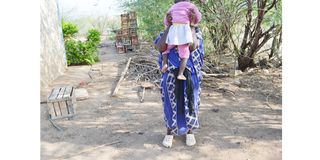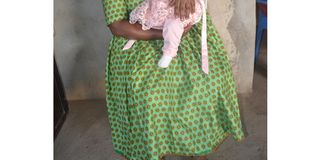Nightmare for Tana parents of children with genital deformities

Fian Mohammed with her child at their new home in Bura Constituency ,Tana River County.
Martha Halako had waited for nine years to have a child of her own.
It was one problem that had left her in-laws talking and even considering calling the marriage off.
Her husband, on the other hand, remained supportive as all medical reports were positive.
Then on March 4, 2017, she conceived, breaking all walls of suspicion and hate to restore joy in her house.
She had finally overcome the turbulence and believed her journey to motherhood had just started.
Nine months later, she delivered a baby at a local private hospital.
The baby threw everyone, including the nurses, into confusion.
“The nurse gasped and almost dropped my baby were it not for the quick response from the midwife,” she recounts.
“The nurse left the room gasping repeatedly. That is when I realised she had been shocked about something on the baby.”
The midwife, a friend of her mother-in-law, was equally shocked and wanted to secretly leave with the baby to kill it, but Ms Halako, having sensed something was amiss, insisted on keeping her baby.
The midwife was adamant that she wanted to leave with the baby.
But she eventually caved in, handed Ms Halako her baby and left.
“I checked my baby and that’s when I noticed what was causing all the drama – it had two genitals. I was shocked as well and fear engulfed me,” she says.
Meanwhile, the midwife had rushed to Ms Halako’s in-laws and informed them of the development.

Martha Halako with her daughter at their house in Tana Delta Sub-County in an earlier photo taken when the baby was eight months old.
Ms Halako’s mother-in-law rushed to the hospital.
“She asked me to confirm if I had given birth to an abomination, but I told her I had given birth to a child with two organs. That is when she told me the baby must die,” she says.
Shortly after, her husband called and after receiving the news of the baby’s deformity, he also told Ms Halako to follow her mother-in-law’s instructions.
His terms were clear - failure to obey would result in immediate termination of the marriage.
They were later joined by a group of middle-aged and elderly women at the hospital. They told her she could not keep the baby and would rather forget having given birth all.
The women told Ms Halako they would make the infant sniff tobacco and put some concoction below its tongue and send it to a quiet sleep without a struggle.
Ms Halako did not buy the idea and instead insisted on keeping the baby.
All this time, she clung to it, as it appeared the women were determined to execute their plan without her will.
“I knew the nurse was part of the plan, so I refused to take any drugs she gave me because I knew they would send me to sleep. I was very cautious,” she narrates.
Later that day, she called over her best friend, and together they planned to leave the hospital in secret with the help of a social worker at the hospital.
She left Galole sub-county to settle in Tana Delta, her secret kept and protected with her life.
Even after she ran away, her in-laws did not give up on pursuing her and the child.
They insisted that the baby had to die because the child was a bad omen for the family.
I had to give my child away to my friend so that she could survive.
I was so depressed that I almost killed the baby,” she says.
She has settled in a community where most women are secretly raising children with similar conditions.
Most of the parents are single, their marriages having ended because of the children they brought to the world.
“I found refuge here, but my child cannot go to school around. I had to find her a school in Lamu, where she lives with a friend of mine and I visit frequently,” she says.
Halako, her child is scheduled for a corrective operation in November 2021 in Germany.
The procedure that will be sponsored by German organization she was linked to by her friends.
According to the medical reports in her possession,the procedure will take place twice and will require the daughter to have at least six months for recovery.
She is optimistic that her daughter will then live free like other children.
Fian Mohammed has had similar birth experiences.
The first delivery shocked everyone in her village, and the baby was immediately killed.
“My father did not even allow the baby to last two minutes. He instructed the traditional midwife to kill it and bury it in the forest,” she says.
Her second child almost met a similar fate at the hands of her mother.
She would not allow such babies to see the sun as the family would be mocked and ostracised.
“Those were two incidents in 2015 and 2018. That prompted my then husband to divorce me. I was also barred by my parents from ever giving birth,” she says.
They were afraid that any attempt to conceive would yield similar results.
But in 2018, her sister delivered a baby with the same condition.
The family was flabbergasted, and the sister suffered trauma.
She would later sneak out of her house at dawn and commit suicide behind her father-in-law’s house.
Meanwhile, plans were made to ensure that the baby she had delivered was killed and buried far away.
However, before they could kill the baby, Ms Mohammed made away with the child at dawn and has been raising her in Bura sub-county.
Her actions left family members furious, vowing to track her and the child down to finish what had been agreed upon, to save the family from bad omen.
“The baby is innocent. I don’t know why people want to fault God at what he does best. People don’t want to accept his will,” she says.
For Ms Mohammed, help is yet to come and she is neither informed if the condition can be rectified through a procedure.
According to Ms Mohammed there are people who have grown with the condition and are living with it.
If help does not come, she will continue to raise the baby.
"Many other parents with children in this condition remain uninformed if it can be surgically dealt with whereas others who are informed say they cannot afford the cost of the procedure,” she says.
Ms Halako and Ms Mohammed are just a handful of parents living in fear of raising children with genital deformities.
Their lives have only known stigma since taking the bold step to keep their children and raise them.
With the children exhibiting strong feminine hormones, their parents live every day with the fear of the children meeting their assailants.
“My girl has received a lot of support from her school but I’m always worried that maybe one day her condition will become public knowledge, and she will be stigmatised or even kill herself out of depression,” Ms Halako says.
Most parents in Tana River County are yet to accept disabled children, says the chairman of the county’s association of people with disabilities, Said Babwoya.
Some parents, he says, choose to end the lives of the children at birth while others hide the children from the public and even mistreat them.
“This condition is not new to our county but the way people in respective families react to a case is frightening even to parents who unexpectedly give birth to such children,” he says.
He notes that for such children to survive in society, it takes the efforts of both parents.
He also says the public needs to be enlightened on such issues to reduce the stigma victims and their parents face.
“Traditional views remain a huge obstacle to highlighting disability issues. I hope one day we will overcome this and look at the disabled like normal human beings,” he says.





